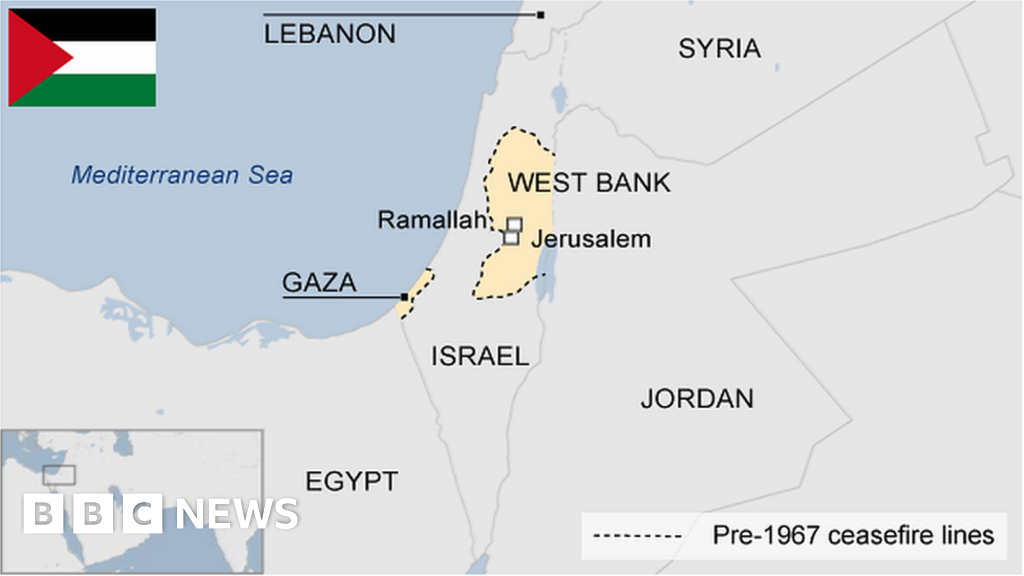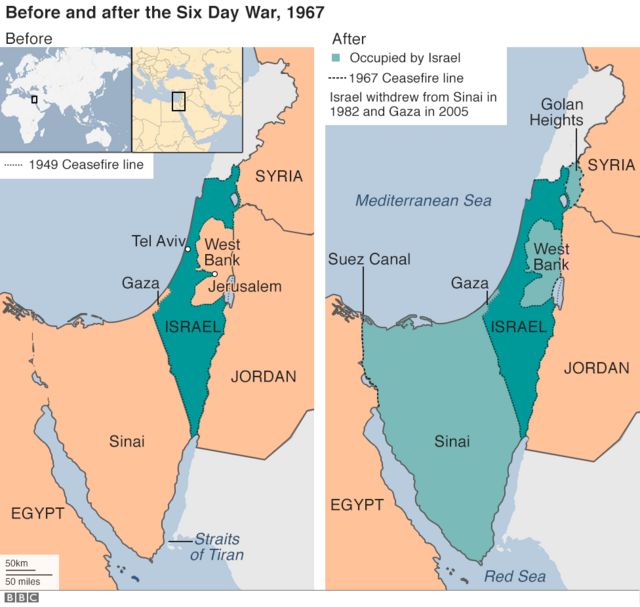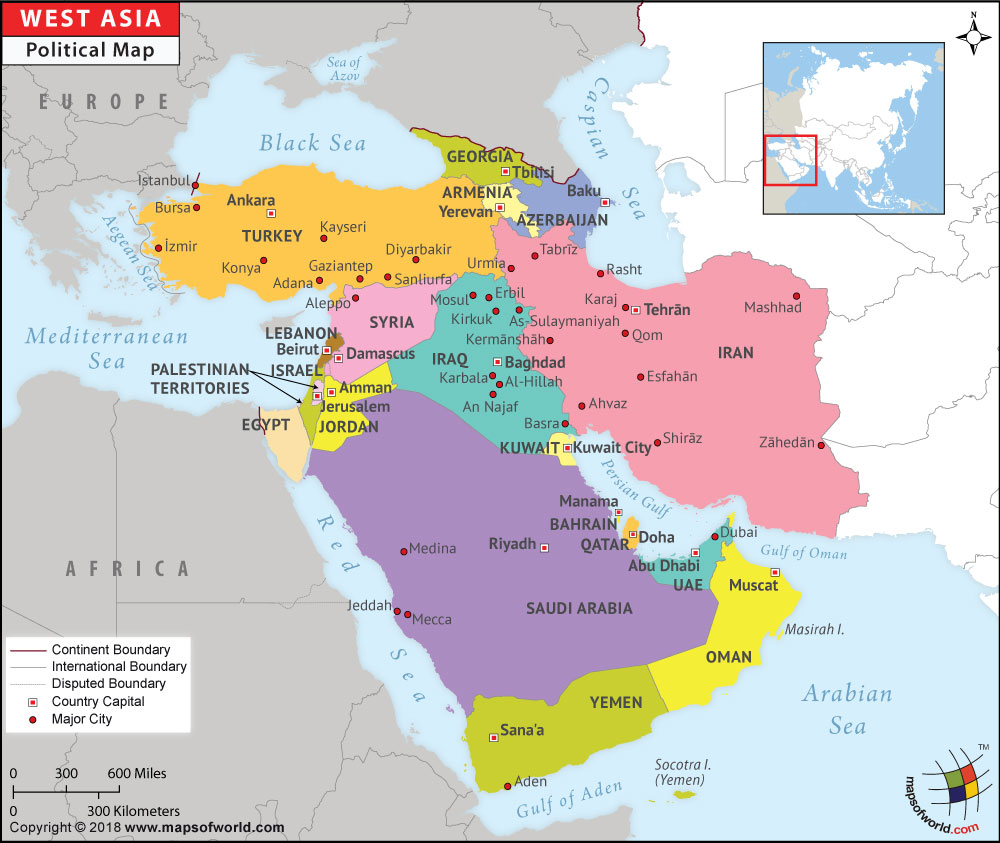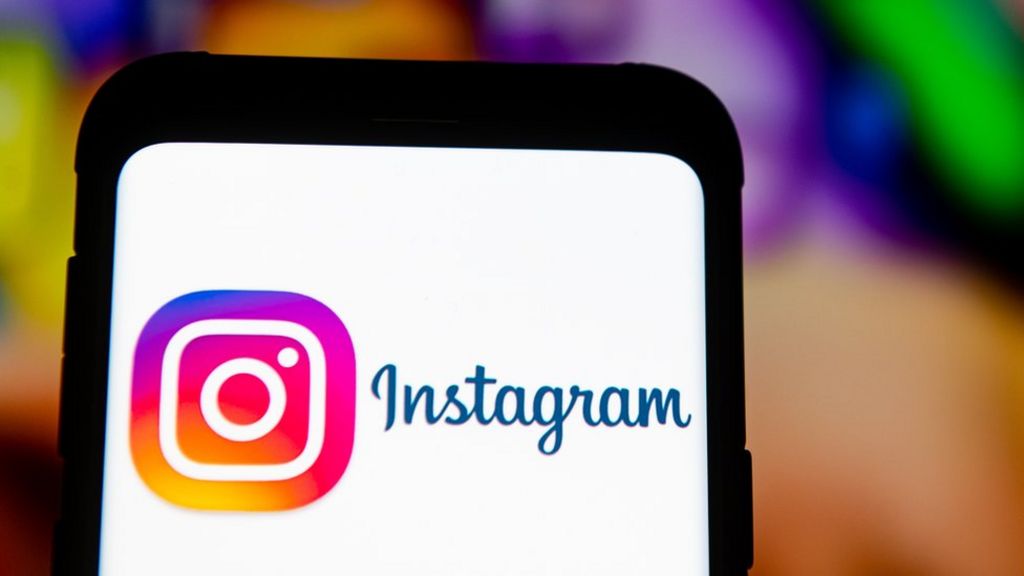International Relations Class 16
INDIA-WEST ASIA RELATIONS(5:10 PM):
- The main actors in the region are Iran, Saudi Arabia, UAE, and Israel.
- Except for Iran, the rest major actors were under the security umbrella.
- However, after the shale gas discovery, the USA started receding from the Middle East and shifted its focus to Asia-Pacific.
- The region is fraught with frictions like:
Iran-Saudi Arabia friction:
- Iran is the global leader of Shias, while Saudi Arabia claims to represent the Sunnis of the world.
- Both wish for domination over the region.
- After the Islamic Revolution of 1979, Iran has been trying to portray itself as the global leader of Muslims.
- Both of the nations have friction with Israel over the issue of Palestine.
- The situation got complex after the Iranian efforts to be a nuclear power.
- Tunisia was the place where the Arab Spring began in 2010.
- During the Arab Spring, various anti-government protests started in the region which led to the toppling of many governments.
India-Israel relations:
- 1948- Israel was created as an independent nation.
- India did not support the creation of the independent state of Israel.
- India at the UNO was in favor of the Minority Plan at the UNO.
- The plan called for the creation of a federal state of Palestine with internal autonomy for the Jewish population.
- Indian partition experience was the main reason why India was not in favor of the creation of another state on the grounds of religion.
- The Balfour Declaration was a public statement issued by the British government on November 2, 1917, during World War I.
- The declaration promised to support the establishment of a "national home for the Jewish people" in Palestine.
- India recognized Israel later in September 1950, for providing consular services to the Jewish population that left India for Israel.
- India normalized its relations with Israel in 1992.
- Normalization here refers to starting diplomatic ties at the Ambassadorial level.
The 42-year gap(1950-1992):
- This time period was not of fallow years and good interactions remained between the two nations.
- Pieces of evidence of interactions:
- Israel supported India during the wars of 1962, 1965, and 1971.
- Israel supported India during the 1974 peaceful nuclear test- Operation Smiling Buddha, which was a subterranean nuclear explosion project.
- India was put under many technical sanctions by the West and India was restricted from advanced weapons due to its closeness with USSR.
- Israel became the source of advanced Western weaponry entering India.
- In the aftermath of Indira Gandhi's assassination, Indis set up the National Security Guards, which some reports claim were trained by Israel.
REASONS FOR DELAYED NORMALIZATION OF TIES (5:35 PM):
- Indian history of partition on religious grounds.
- India was home to a large Muslim population who had sentiments attached to the Palestinian cause.
- India's Interests in West Asia- home to a large Indian diaspora, dependency on oil imports.
- Cold War politics & NAM.
- India supported the Palestinian cause under NAM commitments.
- Palestine was a rallying point or pivot in NAM.
- The Palestinian issue was also pushed in NAM by Egypt which was a founding member of NAM and engaged in armed conflicts with Israel.
- Till 1992, relations between India and Israel were conducted behind the curtains.
- Ministerial-level visits started taking place after 2000- the first NDA regime.
- Pranab Mukherjee in 2015 became the first Indian president to visit Israel.
- Narendra Modi in 2017 became the first Indian Prime Minister to visit Israel.
- It can be observed that under Congress-led regimes at the center, India-Israel relations move behind the curtain.
- Under NDA or BJP-led regimes at the center, India-Israel relations go out in the open.
- BJP is the ideological successor of the Hindu Mahasabha and, hence has less reluctance to identify with the Jewish state of Israel.
- However, Congress as a centrist party emphasizes India as a democratic secular polity and finds it difficult to reconcile with Israel.
- Today we can see a bipartisan consensus for better ties between India and Israel.
Relevance of 2017 Indian Prime Minister visit to Isreal:
- India achieved a de-hyphenation of the relationship between India, Israel, and Palestine.
- This was achieved by not combining his Israel visit with his Palestine visit.
- He paid a separate visit to Ramallah in Palestine in 2018.

Relevance of Jerusalem:
|
Meaning of de-hyphenation here:
- It means that neither of the two countries (Israel & Palestine) enjoys a veto against the other.
- India would pursue independent relations with both the countries.
- India would continue to support the Palestinian cause without compromising India-Isreal relations.
- Presently, New Delhi has the most pro-Israel government ever seen in India.
IS ISRAEL INDIA'S NATURAL ALLY? (6:05 PM):
- Former Indian PM Atal Bihari Vajpayee referred to Israel as India's natural ally.
- Israeli PM Benjamin Netanyahu referred to India-Isreal relations as a "Marriage made in heaven".
- In the Raisina Dialogue, he commented that the two countries have a "natural partnership" and a "natural friendship".
- The India-Israel partnership is an example of a win-win partnership.
- Israel has technology, defense equipment, counter-terrorism cooperation, etc. to offer to India.
- India has a large market to offer, especially for defense products.
- The USA is not a natural ally of India despite both being democracies because both have certain major convergences.
- The USA values multilateralism only till its interests are served.
- Otherwise, it indulges in unilateral sanctions.
- India on the other hand has a much stronger faith in multilateralism.
- PM Modi commented that "India has size & scale, while Israel represents technology and edge.
- Israel derives enormous intangible benefits from its partnership with India.
- 36 UNO members still do not recognize Israel.
- While India is a large liberal democracy with pluralistic traditions and thus recognition by India carries enormous values.
- Both nations are threatened by radical Islam and cross-border terrorism.
Despite the convergences, Israel is not India's natural ally because:
- Natural allies are bound by shared worldviews and common political & cultural values.
- India is a multiethnic, pluralistic, and secular state, while Israel is religiously conceptualized.
- Also, India continues to support the Palestinian cause.
Areas of cooperation:
- Defence:
- Israel is the second largest defense -supplier to India.
- India is the largest defense market for Israel; with around 40% of its annual arms exports.
- India has benefitted from AWACS(Air-Borne Warning & Control System), Pine Radar, etc. for its ballistic defense system.
AWACS:
- It provides situational awareness of an area in terms of the movements of friends, enemies, weather conditions, etc.
- India has the Barak surface-to-air missiles and Spike anti-tank missiles.
- Defense relations have been upgraded to co-designing and co-production of defense equipment under the Make In India initiative.
- The Barak 8 surface-to-air missiles, Sky Strider missiles, Trevor assault rifles, etc., are some of the examples.
- Both nations are also engaged in cyber-defense partnerships.
Water Security:
- Israel uses 90% of its wastewater.
- India is also a water-scarce country.
- India is the only country where Israel has stationed a Water Resource Specialist as a Water Attache in its embassy in New Delhi.
Agriculture:
- India is cooperating with Israel in its drip-irrigation technology & products, vertical farming, horticultural mechanization, dairy farming, etc.
ECONOMIC COOPERATION BETWEEN INDIA & ISRAEL (6:40 PM):
- Over the past 25 years, bilateral trade has increased from $200 million to $ 4 billion, excluding defense.
- Both want to conclude a free trade agreement.
- The Adani group has acquired the Haifa port -the second largest port in Israel.

- There is active cooperation between startups of both countries, as seen with an increasing trend of mergers.
Cultural Cooperation:
- India has been one of the few countries that saw no anti-semitism or racial attacks.
- The first-generation Jews who migrated from India to Israel practiced the Indian way of life.
- During the COVID-19 pandemic, Israel encouraged the Indian way of greeting- "Namaste".
- Direct flights have been launched between Indian cities and Tel Aviv.
- Netanyahu also encouraged Bollywood to shoot movies in Israel.
INDIA -PALESTINE RELATIONS(7:10 PM):
- First Phase- 1948-1992:
- Indian support for Palestine was like an article of faith- a very strong commitment.
Pieces of evidence:
- During the Arab- Israel wars(1948, 1956, 1967, 1973, 1982), India recognized Israel as the aggressor.
- Arab countries lost all wars.
- India supported the Palestinian Liberation Organization(PLO) and its leader Yasser Arafat.
- In 1975, India became the first non-arab country to recognize PLO as the legitimate representative of the Palestinian people.
- In 1988 when the PLO declared an independent state of Palestine with its capital in east Jerusalem, India immediately granted recognition.
- In the 1967 Six-Day War, Israel captured 78% of Palestinian territory and the Golan Heights from Syria.

- India supports an independent state of Palestine as of 1967 with east Jerusalem as its capital, which lies alongside Israel.
- This is India's Two-State solution.
Second Phase: 1992-2017:
- India recognized Israel because of the Madrid Agreement under which PLO accepted the two-state solution.
- PLO also lost Arab support because PLO supported Iraq's invasion of Kuwait in 1990.
- We continued to support the Palestinian cause.
Pieces of evidence of Indian support:
- India supported Palestinian membership in 2011, even when the USA didn't.
- India supported Palestinian membership of UNo as an observer non-member state.
Third Phase- After 2017:
- It saw the de-hyphenation of Indian relations with Palestine from that of Israel.
- India continues to support the Palestinian cause.
Pieces of evidence of Indian support:
- 2018 visit of Indian PM to Ramallah.
- India voted against the Trump administration's recognition of Jerusalem as the Israeli capital.
- In the context of the 2021 violence between Israel & Palestine, India labeled Israel as the aggressor and voted against the Israeli Settlement Policy.
- Under the policy, Israel supported the settling of the Jewish population in the disputed territories
Present stand of India:
- India supports an independent Palestine consisting of Israel.
- India has dropped references to the 1967 borders and east Jerusalem as the capital of Palestine.
Reasons for Indian consistent support to the Palestinian Cause:
- The safety of Indian diaspora in the Middle East.
- Large remittances.
- Nearly 50% of Indian energy imports are from West Asia.
- Abandonment of the Palestinian Cause would provide traction to Pakistan to form a Pan-Islamic alliance on the Kashmir issue against India.
- India's global aspirations:
- India seeks permanent UNSC membership, for which a reform of the UN charter which will need 2/3rd majority support is essential in UNO.
- The Organization of Islamic Cooperation(OIC) has 57 members which represent more than 1/4th of UNO membership.
UN has 193 members with South Sudan being its newest member in 2011 - Consonance with Indian Values:
- India's policy towards Palestine is consistent with the Indian values against imperialism, racism, etc.
CHALLENGES TO INDIA'S PALESTINIAN POLICY (7:40 PM):
I. Relations with the USA:
- Indian stand can become an irritant as the USA supports Israel.
II. Global Power Image:
- The Indian position is perceived as that of a fence-sitter on the issue.
- The image does not augur well for Indian global power ambitions.
III. Clash with Indian stand on terrorism:
- Palestine presently comprises the Gaza Strip & the West Bank
- West Bank has the government of the Palestinian Authority led by Mohammad Abbas while the Gaza Strip is controlled by Hamas which is a recognized terrorist organization.
- Supporting Palestine would mean supporting Hamas too and India does not distinguish between good and bad terrorists.
- The efficacy of Indian foreign policy is dependent upon the success of this balancing act.
- This would depend upon a predictable, principled, and unbiased stance of India on the issue.
Abraham Accords 2020:
- UAE signed the accord with Israel with the mediation of the USA.
- For the first time, UAE and Bahrain recognized Israel as a state and sought to normalize diplomatic relations.
- UAE was the first Gulf country to normalize ties with Israel.
Gulf Countries:
- There are six countries under the Gulf Cooperation Council(GCC).
- They are Saudi Arabia, UAE, Oman, Qatar, Bahrain and Kuwait.
- The gulf here means the Persian Gulf.

- Iraq also has a coast on the Persian Gulf, but it is not a member of the GCC.
- Iran is not a member of the GCC as the GCC is dominated by Saudi Arabia.
- Bahrain, Morocco, and Sudan later normalized relations with Israel.
- UAE is the third Arab country after Egypt(1979) and Jordan.
I2U2 (India- Israel-United Arab Emirates-USA):
- The first virtual Leader's Summit of I2U2 was held in 2021.
- Aims of I2U2:
- They identified themself as a geo-economic cooperation.
- As of now, I2U2 has identified six areas of cooperation:
- I.Water.
- II.Energy.
- III. Transportation.
- IV. Space.
- V. Health.
- VI. Food Security.
- I2U2 was first mentioned in the Abraham Accords.
I2U2 has announced two projects and both are based in India:
- I. UAE would invest in building food parks in Madhya Pradesh, Gujarat, etc.
- The private sectors of the USA and Israel would support it.
- II. A $330 million hybrid renewable energy project in Dwarka Gujarat.
The topics for the next class are the importance of I2U2, India-Saudi Arabia Relations, and India-Iran relations.
1)
With respect to the technology Airborne Warning and Control System (AWACS), which of the following is correct?
1. It is described as an ‘Eye in the Sky’ as it can carry out surveillance under all-weather situations
2. India has an agreement with Israel for the supply of its AWACS called Phalcon
Select the correct code from the following.
(a)1 only
(b)2 only
(c)Both 1 and 2
(d)None of the above
2)
Consider the following statements:
- In 2018, India adopted a de-hyphenation policy which simply means that India’s relationship with Israel would stand on its own merits, independent and separate from India’s relationship with the Palestinians.
- India voted for Palestine to become a full member of UNESCO in 2021.
Which of the given statements is/are not correct?
(a)1 only.
(b)2 only
(c)Both 1 and 2 .
(d)Neither 1 nor 2 .
3)
Which of the following countries have signed a US-brokered agreement that has come to be known as the ‘Abraham Accord"?
(a)UAE and Israel.
(b)Palestine and Israel.
(c)USA and Israel.
(d)Israel and India.
4)
Consider the following system-
Defence system Country of origin
1. Phalcon Israel
2. Rafale France
3. MiG 21 Russia
Which of the pairs given above is/are correctly matched?
(a)1 only
(b)1,2 and 3
(c)3 only
(d)2 and 3 only
5)
Which country controlled Palestine at the time of the Balfour Declaration?
(a)France
(b)Germany
(c)Britain
(d)Ottoman Empire
6)
How many of the following countries have a boundary with the Mediterranean Sea?
1. Jordan
2. Israel
3. Lebanon
4. Palestine
Select the correct option using the code given below.
(a)Only One
(b)Only Two
(c)Only Three
(d)All the Four
7)
Consider the following statements with respect to the Israel-Palestine:
1. In 1948, India voted against the UN partition plan of Palestine in the General Assembly.
2. India welcomed the US"s move to shift its embassy to Jerusalem.
Which of the above statements is/are incorrect?
(a)1 only
(b)2 only
(c)Both 1 and 2
(d)Neither 1 nor 2
8)
Consider the following pairs (Prelims 2023):
| Region in News | Reason for being in the news |
| North Kivu & Ituri | War between Armenia & Azerbaijan |
| Nagorno-Karabakh | Insurgency in Mozambique |
| Kherson & Aporizhzhia | Dispute between Israel and Lebanon |
How many of the above pairs are correctly matched?
(a)Only One
(b)Only two
(c)All three
(d)None
9)
Discuss the areas of cooperation between India and Israel. [150 words/10 Marks]
10)
Explain "dehyphenation of relations" in the context of India, Israel & Palestine.9150 words/10 marks)
11)
Trace the India-Israel ties from inception of both countries to the present times. (150 words/10 marks)
12)
Trace the India-Palestine ties from inception of both countries to the present times. (150 words/10 marks)
13)
What are the factors behind Indian continuous support of the Palestinian cause ?(150 words/10 marks)
Answers
1) c
2) b
3) a
4) b
5) c
6) c
7) b
8) d
India"s relations with Israel have, of late, acquired a depth and diversity, which cannot be rolled back. Discuss. (10 Marks/150 words)
(10 marks)





0 Comments